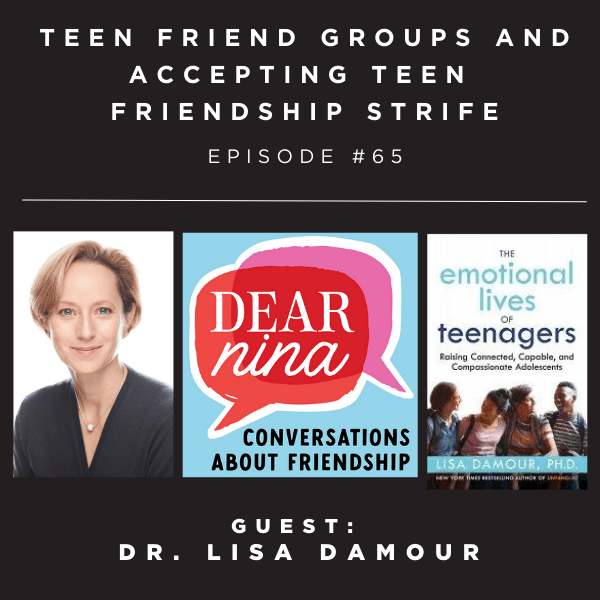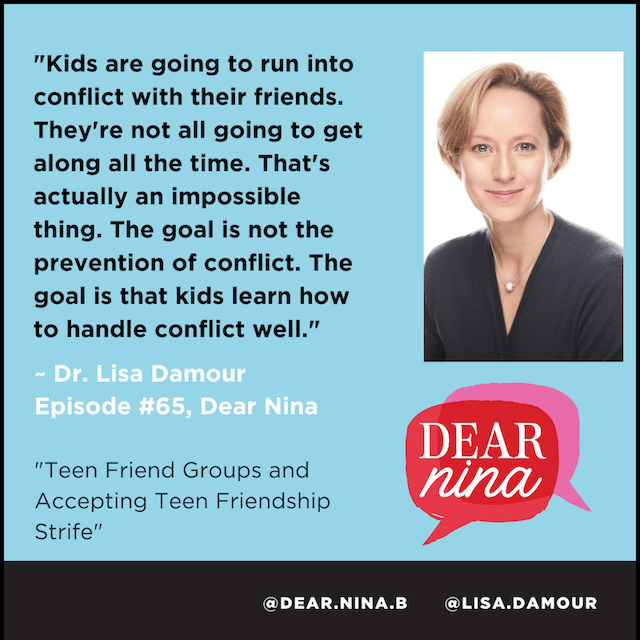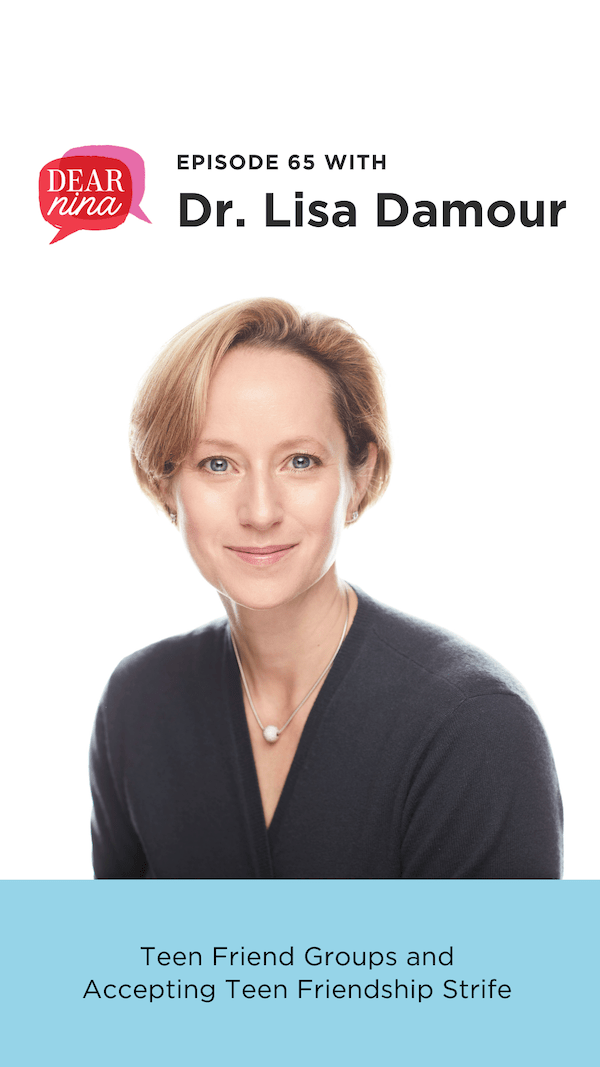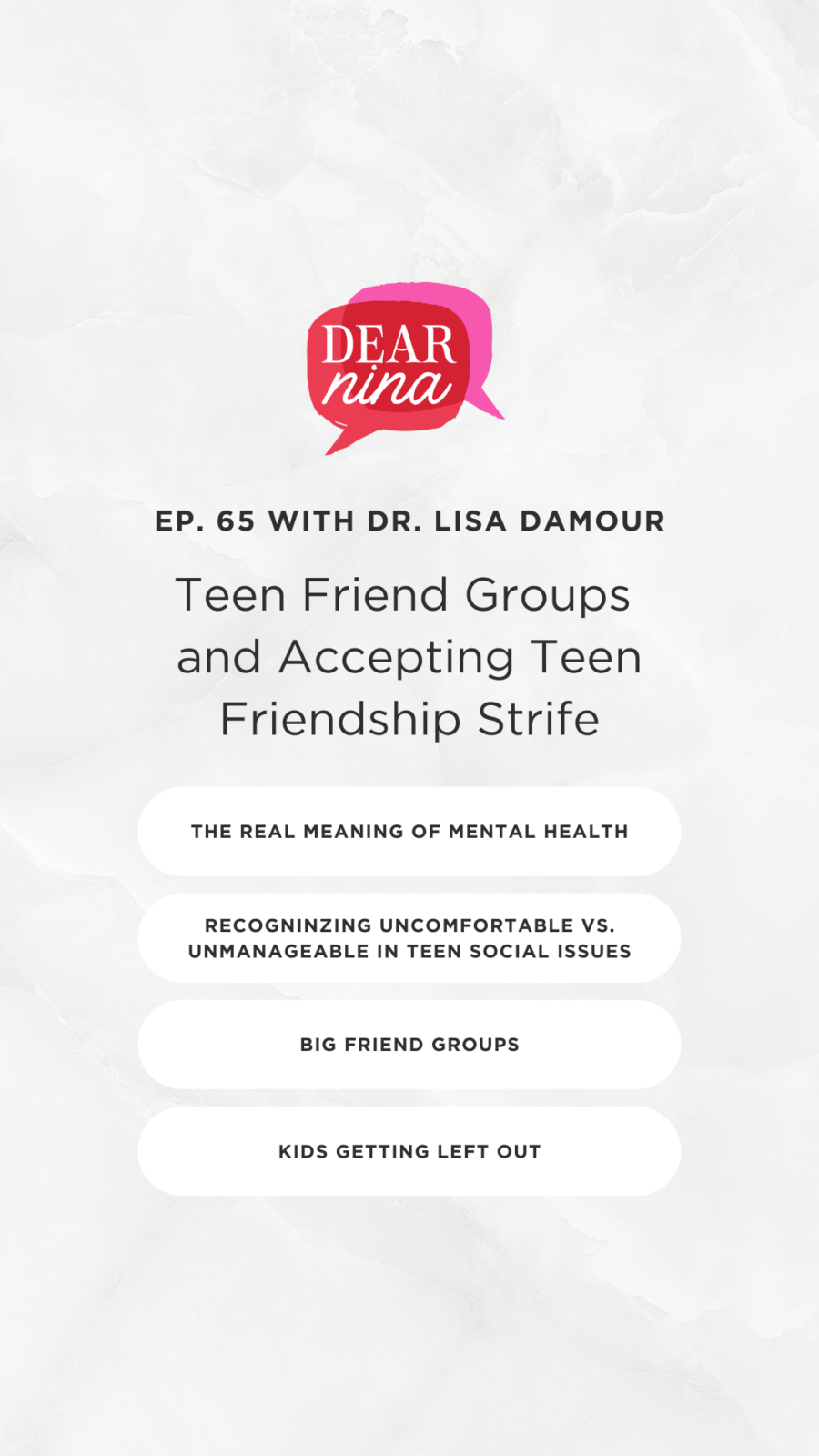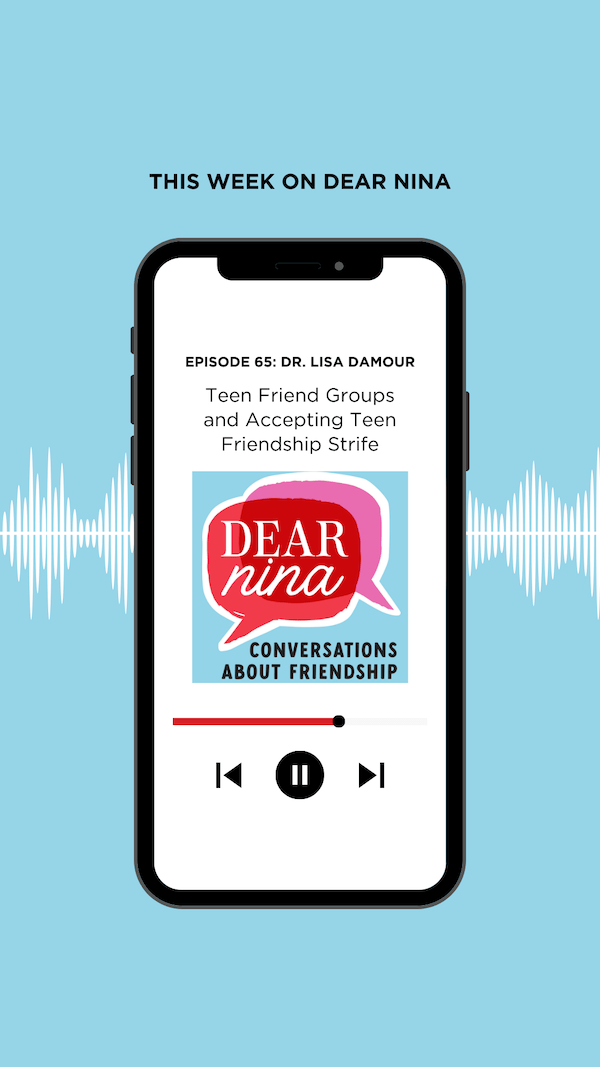Teen Friend Groups Today and Accepting Teen Friendship Strife
It is truly an honor to have renowned psychologist Dr. Lisa Damour on Dear Nina. Lisa is the three time New York Times bestselling author of Untangled, Under Pressure, and now her latest, The Emotional Lives of Teenagers. She’s the co-host of the Ask Lisa Podcast, which I highly recommend to anyone with kids.
Dr. Lisa Damour is the New York Times bestselling author of Untangled, Under Pressure, and The Emotional Lives of Teenagers. She’s also the co-host of the Ask Lisa Podcast, which I highly recommend. On Dear Nina, I normally focus on adult friendships, but sometimes I will touch on teen friendships because teen friend strife is slipping into adult friendships. While it was once expected that teens would experience huge friendship changes as part of growing up, it now seems making sure teens never feel upset about their social lives is yet another thing for parents to manage for their kids. Lisa’s work helps adults come to terms with how much distress is to be expected in teens’ lives and when there’s cause for concern.
FIND EPISODE #65 ANYWHERE YOU LISTEN TO PODCASTS!
Signup for my newsletter on friendship, books, TV, and more.
Meet Dr. Lisa Damour
Dr. Lisa Damour is the author of three New York Times best sellers: Untangled, Under Pressure, and The Emotional Lives of Teenagers. She co-hosts the Ask Lisa podcast, works in collaboration with UNICEF, and is recognized as a thought leader by the American Psychological Association. Dr. Damour is also a regular contributor to The New York Times and CBS News.
Dr. Damour serves as a Senior Advisor to the Schubert Center for Child Studies at Case Western Reserve University and has written numerous academic papers, chapters, and books related to education and child development. She maintains a clinical practice and also speaks to schools, professional organizations, and corporate groups around the world on the topics of child and adolescent development, family mental health, and adult well-being.
Dr. Damour graduated with honors from Yale University and worked for the Yale Child Study Center before earning her doctorate in Clinical Psychology at the University of Michigan. She has been a fellow at Yale’s Edward Zigler Center in Child Development and Social Policy and the University of Michigan’s Power Foundation. She and her husband are the proud parents of two daughters.
Find Dr. Lisa on Instagram and Twitter.
Topics We Covered:
-
Accepting that teenage social strife is a normal part of growing up and not something to help kids avoid at all costs.
-
Teens will get left out and leave others out as a normal part of growing up.
- The solution to kids getting left out is not– everyone gets invited to everything. The solution is helping kids, teens, and frankly, adults, accept that it’s impossible to include everyone in everything. It’s normal to have a negative emotion about it, then move on and make your own plan.
-
Friend groups seem overly formal to adults these days, but it’s a reality for teens. Lisa said, “If your kid has one or two good buddies, leave it alone. It’s perfect. If your kid has a large friendship group, do not assume that anyone is going out of their way to cause trouble. It is the nature of those larger groups.”
-
In friend groups of over four kids, it’s impossible to expect that every person will like each other equally. Some people will be closer than others.
-
If your teen has a few close friends, they have everything they need for a positive social life. Do not worry if they’re not part of a bigger group. Reassure your kid that we have really good data showing that the least stressed kids have one or two good friends
-
Understanding that mental health has come to be equated with feeling good or relaxed or happy. These are all wonderful things, but they’re not actually what mental health is. Dr. Damour explains that being mentally healthy is about having feelings that fit the circumstance and then managing those feelings well, even if those are negative emotions.
- Helping parents not be afraid of teenagers’ negative emotions, which are evidence of good mental health and an opportunity to learn how to deal with conflict and strife.
- Learning the difference between uncomfortable and unmanageable. Just because a teen (or an adult) is an uncomfortable situation, that doesn’t make it a problem we need to solve immediately. This is an opportunity for growth and competence and confidence.
- Knowing the difference between kids’ discomfort and parents’ discomfort. Parents sometimes freaking out more than their teens about social dynamics.
- Helping teens make the most of the friendship strife they face by learning how to handle conflict. This will serve them for the rest of their lives.
Favorite Quotes:
On being friends with the parents of your kids’ friends, Lisa said, “There’s a lot of people to be friends with. And if you have the degrees of freedom to keep your social life separate from your kid’s social life, I think there’s real value in it.”
When your kid is left out: Lisa said, “Our job as the adults in the picture is to say it’s a feeling. It is uncomfortable. It’s probably not unmanageable. I’m here to help you address it. But we don’t have to leap into action to prevent the experience of the negative emotion.”
On big friend groups: Lisa said,
“Kids think they want big groups. There’s no big group that works well. And the reason there’s no big group that works well– and by big, I mean more than four kids– is it’s absolutely impossible for four people or more of any age to like one another equally. It never works. And so these poor kids are stuck in this dynamic where I think out of basic insecurities of being a teenager and wanting to make sure you’ve got people to do things with, they coalesce into groups that may have five or six or seven or even bigger than that. And then drama ensues. Not because they’re bad kids, but because you cannot get a group of five or six or seven or eight who like one another equally. So there will be kids in that group where there’s oil and water– they just don’t get along. Then within the group, kids feel recruited to choose one side or another. There will be subgroups within that group. If you’ve got eight kids, there’s going to be three who really want to hang together. So occasionally they will. And then of course sometimes they will put it up online and then everybody sees it and it feels really lousy. But of course not all eight are going to want to hang out together all the time.
What’s the solution here? Here is the solution: Reassure your kid that we have really good data showing that the least stressed kids have one or two good friends. Full stop.”
“If your kid has one or two good buddies, leave it alone. It’s perfect. If your kid has a large friendship group, do not assume that anyone is going out of their way to cause trouble. It is the nature of those larger groups.”
On dealing with kids’ friendship strife: Lisa said,
“Rather than being crouched in a defensive posture, thinking, I hope my kid’s social life goes great–give that up. It’s never going to happen anyway. Instead be of the mind–conflict’s happening; this is my grand opportunity to teach my kid how to handle conflict well.”
Let’s connect!
- Here’s my Substack newsletter about friendship & more
- Instagram, TikTok, Twitter
- JOIN the Dear Nina Facebook group
- Ask an anonymous question
If you like what you’re hearing, please tell a friend!
Also, if you can rate and/or leave a review on Apple Podcasts, I’d be so grateful.
Latest posts by Nina Badzin (see all)
- Dear Nina in The Guardian - May 1, 2024
- Overtalking, Undertalking, and Lessons for Friendships in the Art of Storytelling - April 30, 2024
- Dear Nina in The Wall Street Journal - April 27, 2024
- 5 Friendship Issues to Consider Addressing with a Therapist - April 17, 2024
